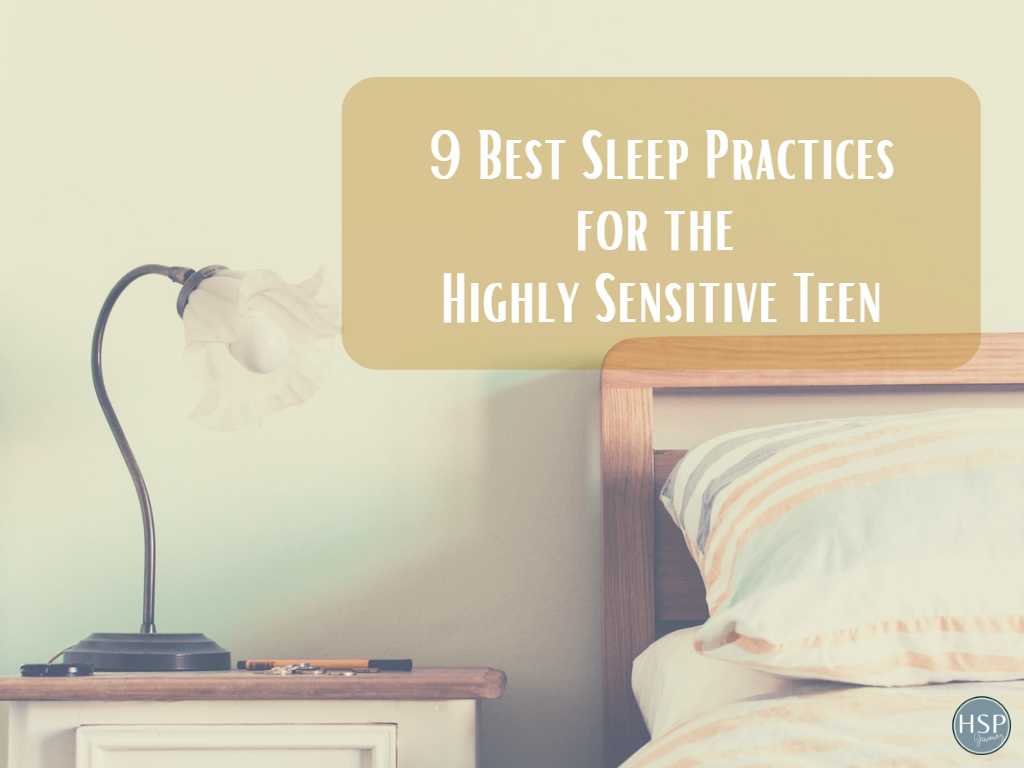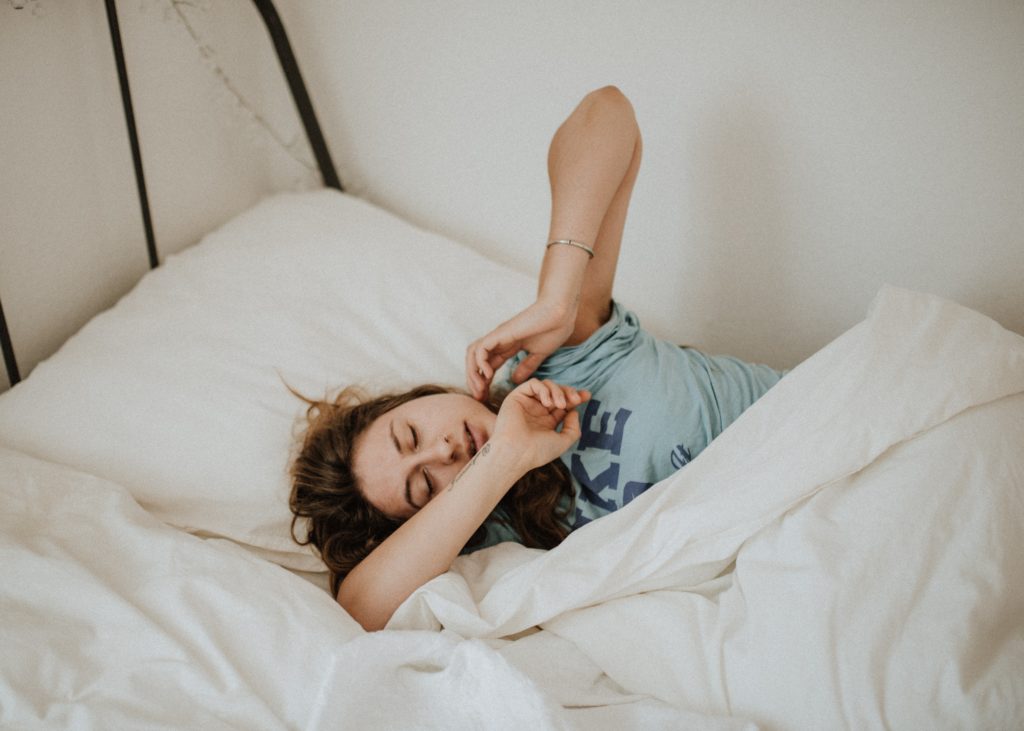Highly Sensitive Teenagers often have difficulty getting a good night’s sleep. Between all of the physical changes, brain growth, academic challenges, and social-emotional pressures of adolescence, these special kids are dealing with a lot on top of being highly sensitive. In this article, we’ll look at best sleep practices for the highly sensitive teen.

Some highly sensitive teens experience sensory sensitivity, while others experience emotional and energetic sensitivity. A lucky few even experience more than one type of sensitivity at the same time! All of these factors amount to a heavy load on the teen’s nervous system, making it hard to wind down and get quality rest at night. Often highly sensitive teens’ nervous systems are just too overstimulated at the end of the day to be able to fall asleep and/or stay asleep.
Table of Contents
Adolescence is a critical time for developing good sleep habits, in part because the brain is experiencing growth and is laying down “wiring” for the future. When teens work towards establishing consistent, healthy sleep, they are more likely to have good physical and mental health long into the future. When sleep is impaired, teens are more likely to struggle in a variety of areas.
In his book, Why We Sleep, Matthew Walker discusses research that indicates teens who are sleep deprived are more prone to developing serious mental health disorders, along with physical health concerns such as compromised immune systems and metabolic disorders.
So, what is a highly sensitive teen with an overstimulated nervous system to do when sleep just won’t come? It is important to have a multi-layered approach that includes preventive strategies during the day, along with specific strategies around bedtime.
In considering preventive strategies during the day, the goal is to find ways to reduce overstimulation in the teen’s nervous system, so that they aren’t so frazzled at the end of the day. Fortunately, these strategies are numerous and are easily individualized.
These 4 Preventative Teen Sleep Strategies Can Help:
Preventative Strategy #1 – Exercise: Ideally for at Least One Hour Daily
Regular exercise helps highly sensitive bodies discharge the stress they’re carrying, along with having proven benefits for both mental and physical health.
Preventative Strategy #2 – Get Outside
Neuroscientists have found that exposure to natural light is important for balancing circadian rhythms which govern sleep, especially early in the day. In addition, spending time in natural environments is soothing to the nervous system.
Preventative Strategy #3 – Eat Healthy Food on a Regular Schedule
If your body is hungry, starved for nutrients, or overwhelmed by too much food, sugar, or stimulants such as caffeine, your body is going to have a hard time relaxing enough to get quality sleep. Many teens favor highly caffienated beverages such as coffee and energy drinks. Encourage them to refrain from these or limit themselves to one a day, preferrably before lunch.
Preventative Strategy #4 – Stick to a Routine
Whenever possible, try to adhere to a similar schedule of activities each day. Routines help our sensitive bodies stay calm because they know what to expect. Bodies like predictability and having the same rhythm each day as much as possible.
Here Are 9 Best Sleep Practices for the Highly Sensitive Teen:
Sleep Practice #1 – Regular Schedule of 8+ Hours of Sleep
Keep to a regular bedtime schedule and allow for a minimum of eight hours of sleep. Most teens need 10-12 hours of sleep per night. If this is hard to do on your own, ask for support from a parent or friend who will help you adhere to a schedule.
Sleep Practice #2 – Plan at Least 1 Hour of Relaxation Time Before Bed
Encourage your teen to plan for at least one hour of relaxing activities before bed. This supports the teen’s sensitive body in winding down and discharging stress. These may include hygiene rituals (bath/shower), gentle stretching or exercise such as yoga or qigong, and calming exercises for the nervous system such as rhythmic movement, full-body shaking, deep breathing, and pressure point massage. An hour may seem like a lot, but often it is what is needed to fully unwind.
Sleep Practice #3 – Avoid Screens for at Least 1 Hour Before Bed
Avoid screens including tv, phone, and computer for at least one hour before bedtime. Screens are especially hard for highly sensitive teens to disconnect from, and many report losing track of time if they go online too close to bedtime, resulting in them getting less sleep than planned.
Sleep Practice #4 – Take Time to Emotionally Process the Day
Take time to emotionally process your day with a close friend by phone or family member. If talking to people is overstimulating, consider journaling as a way to process your day instead. Taking care of your emotions in these ways helps reduce stress and may stop you from “spinning” your thoughts on some topic that has been worrying you (which tends to keep many HSTs awake).

Sleep Practice #5 – Create a Calming Sleep Environment
Set up your sleeping space so that it is calming. A tidy, organized space is easier to relax in for most people than a messy one. You may also want to add items to your environment that are relaxing, such as peaceful images on the walls, aromatherapy, crystals, and/or music or sounds that help you decompress.
Sleep Practice #6 – Use Sensory Aids
Use sensory aids such as a weighted blanket, noise-canceling headphones, eye pillows, and soft clothes and bedding to help your body relax so that you may fall asleep easier.
Sleep Practice #7 – Take Natural Sleep Aids
Under the care of a qualified health professional, consider taking natural sleep aids and supplements which have a calming effect.
Sleep Practice #8 – Try Visualization
If you enjoy visualization, it is helpful to imagine your bedroom is a nature spot: once you lie down and close your eyes, imagine your favorite beach or spot in the woods. Take time to visualize all the details, and include in your mind the sounds and smells of the nature spot to give your body the full sensory experience of it. This helps ground your sensitive body, as well as takes your mind off other things that may be worrying you.
Sleep Practice #9 – Use Guided Relaxation and Meditation
Many people benefit from some type of guided relaxation to go to sleep. You may find these in apps, podcasts, YouTube, or online communities. My website resources page has a number of meditations that support relaxation.
Final Thoughts
If using all of these ideas seems impossible given your schedule or temperament, consider just picking one or two of them and using them consistently over time. The goal is to make incremental changes that will be sustainable long into the future. It takes time to learn new habits, but your well-being is worth the effort.
Be sensitive, be free
*This post contains affiliate links and I will be compensated if you make a purchase after clicking on my links*





[…] Sleep is especially crucial for HSPs like me to recharge our senses and avoid burnout. Due to our constantly overstimulated nervous system, we often need more sleep than others. It’s essential for me to prioritize a good night’s rest to maintain my well-being. […]